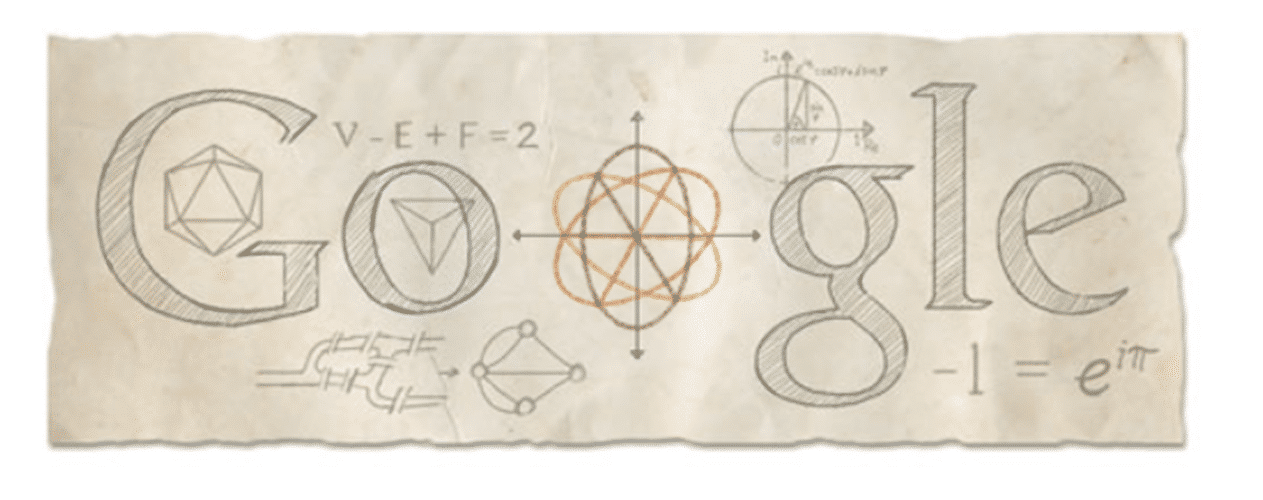Leonhard Euler: Master Mathematician and Visionary

Image Courtesy: Google Doodle
Leonhard Euler (15 April 1707 – 18 September 1783) was a Swiss mathematician, physicist, astronomer, geographer, logician, and engineer who founded the studies of graph theory and topology and made pioneering and influential discoveries in many other branches of mathematics such as analytic number theory, complex analysis, and infinitesimal calculus.
Life and Career
Leonhard Euler was born on 15 April 1707, in Basel, Switzerland. He was raised in a Calvinist family and showed early aptitude in mathematics. Euler’s father recognized his talent and provided him with a strong education in mathematics, despite his initial interest in theology. Euler attended the University of Basel, where he studied theology and mathematics, and later moved to the Russian Empire to pursue his academic career.
Euler’s academic career took him to several prestigious institutions in Europe. He worked at the St. Petersburg Academy of Sciences in Russia for 25 years and held various positions, including professor of physics and mathematics. During his time at the academy, Euler made numerous groundbreaking discoveries in mathematics and published over 800 papers on a wide range of topics, making him one of the most prolific mathematicians in history.
Contributions to Mathematics: Euler made significant contributions to many areas of mathematics. He is considered the founding father of graph theory, and his work on the Seven Bridges of Königsberg problem is considered a landmark in the field. Euler also made important contributions to number theory, including his famous formula relating the number of edges, vertices, and faces of polyhedra, known as Euler’s polyhedron formula. He made advancements in calculus, particularly in the field of mathematical analysis, and introduced many notations that are still in use today, such as the symbols for the mathematical constant “e” and the Greek letter “Σ” for summation.
Euler’s work laid the foundation for many areas of modern mathematics, including topology, complex analysis, and graph theory, and he is regarded as one of the greatest mathematicians of all time. His work has had a profound and lasting impact on mathematics and has influenced generations of mathematicians and scientists.
In 1766, Euler became blind in one eye, and in 1771 he became completely blind. Despite his loss of sight, he continued to work and make significant contributions to mathematics with the help of his students and collaborators. Euler spent the last years of his life in St. Petersburg, Russia, and he passed away on 18 September 1783.
Euler’s legacy as a mathematician and scientist is immense. His work has been foundational in many areas of mathematics and has had a lasting impact on numerous fields of science and engineering. Today, Euler is remembered as one of the greatest mathematicians in history, and his name is associated with many important mathematical concepts and results. His work continues to be studied and celebrated by mathematicians and scientists around the world, and his contributions to the field of mathematics remain influential to this day.
Award and Legacy
His contributions to mathematics and science have been widely recognized and celebrated posthumously. Here are some aspects of Euler’s legacy:
- Prolific Publication: Euler was one of the most prolific mathematicians in history, with an estimated 800 publications to his name. His extensive body of work has had a profound impact on mathematics and science, and his papers continue to be studied and referenced by mathematicians and scientists today.
- Foundational Contributions: Euler’s work laid the foundation for many areas of modern mathematics, including graph theory, number theory, topology, and mathematical analysis. His concepts, formulas, and notations are still widely used in mathematics and other fields of science and engineering.
- Euler’s Polyhedron Formula: Euler’s formula relating the number of edges, vertices, and faces of polyhedra (V – E + F = 2) is one of his most famous results and has been used extensively in graph theory and topology. It is considered a landmark in mathematics and has applications in various areas of science and engineering.
- Influence on Other Mathematicians: Euler’s work has influenced numerous mathematicians and scientists who followed him. Many famous mathematicians, such as Carl Friedrich Gauss, Bernhard Riemann, and Henri Poincaré, were influenced by Euler’s work and built upon his ideas in their own research.
- Euler’s Notation: Euler introduced many notations that are still in use today, such as the symbols for the mathematical constant “e” (base of natural logarithm) and the Greek letter “Σ” for summation. These notations have become standard in mathematics and are used worldwide in various mathematical disciplines.
- Eulerian Graphs and Euler’s Identity: Euler’s work on graph theory led to the concept of Eulerian graphs, which are widely used in computer science, transportation networks, and other fields. Euler’s famous formula “e^(iπ) + 1 = 0,” known as Euler’s identity, is regarded as one of the most beautiful and profound mathematical equations, and it has applications in mathematics, physics, and engineering.
- Legacy in Physics and Engineering: Euler’s work in mathematics also had a significant impact on physics and engineering. His contributions to fluid dynamics, mechanics, and optics, among other areas, have been instrumental in advancing these fields and have had practical applications in engineering and technology.
Leonhard Euler’s legacy as a mathematician and scientist is enduring, with his work continuing to be widely studied, referenced, and celebrated by the scientific community. His pioneering ideas, formulas, and notations have become standard in mathematics and other fields, and his work has influenced generations of mathematicians, scientists, and engineers. Euler’s profound impact on mathematics, science, and engineering has earned him a lasting legacy as one of the greatest mathematicians in history.
On 15 April 2013, Google celebrated Leonhard Euler’s 306th Birthday with a doodle.
Observer Voice is the one stop site for National, International news, Sports, Editor’s Choice, Art/culture contents, Quotes and much more. We also cover historical contents. Historical contents includes World History, Indian History, and what happened today. The website also covers Entertainment across the India and World.

